- Home
- Ian Buruma
Taming the Gods Page 3
Taming the Gods Read online
Page 3
This was true of course only up to a point—the main point being slavery. George Whitefield was unusual for his time in that he preached to slaves and prayed for their salvation. But he was not opposed to the system and even owned a few slaves himself while living in Georgia. However, Tocqueville had another insight that still helps us understand something about America today. Shocked by the violence of the French Revolution, Tocqueville was fascinated by why other societies avoided such a cataclysmic event, especially aristocratic England with its vast differences in standing and wealth. Religion had to have something to do with it. Catholicism, he mused, “may dispose the faithful to obedience, but it does not prepare them for inequality. However, I would say that Protestantism in general orients men much less toward equality than toward independence.”12
So not only did the evangelical brand of American Protestantism favor histrionic emotion over superior learning and democracy over authoritarianism, but it was also a brand of individualism that tolerated inequality as long as men were free to compete for “the good things of this world.” Some forms of American evangelism were (and still are) actively opposed to capitalism, but one can see why free religious enterprise could also be used to promote it. Perhaps it was precisely because people were convinced that they, or at least all white folks, were equal before God that they could live more easily with being unequal in this world. A Marxist would say, with some justice, that this is precisely why capitalists have a reason to promote that faith.
A system that promotes economic and political freedom does not, however, exclude moral bigotry. The puritan ethics that Tocqueville saw as the bedrock of American society and a necessary condition for building stable democratic institutions in the United States also bred a degree of social conformity that dismayed him. Like all survivors of revolutionary violence, Tocqueville was fearful of mass conformity, which could easily lead to mob rule. The same people, who insisted on their individual rights as citizens of a democratic republic, were capable of inflicting horrific violence on others on the basis of their sexual practices or simply the color of their skin. Religion has often been used to justify such savagery.
Europeans, though less prone, in recent times, to turn to God as an ally, have stained their history with even more blood than the Americans. And the establishment of democracies in Europe has been, on the whole, a more painful process. Religion has had much to do with this. The question is, however, whether this reveals a rift between the Old World and the New World or more between religious traditions that cut across that wide watery divide.
As the First Great Awakening was taking place in the United States in the middle of the eighteenth century, David Hume wrote his essay “Of Superstition and Enthusiasm.” It is in some ways a surprising essay for a man of his conservative temperament, though not untypical of certain English prejudices. Hume, like Spinoza a century earlier, had little respect for any form of religion. All religion is “false,” as far as he was concerned, but he made some interesting distinctions and was more inclined than Spinoza to recognize the importance of religious institutions. There were two kinds of believers, in his view: the superstitious and the enthusiasts. The former tend to be fearful, melancholy, even abject, and thus much too timorous to approach the Divinity by themselves. This is why, in Hume’s words, “superstition is favorable to priestly power.”13
Enthusiasts, on the other hand, are drawn to irrationality by a surfeit of self-confidence: “Hope, pride, presumption, a warm imagination, together with ignorance, are, therefore, the true sources of enthusiasm.” While the superstitious turn anxiously to churchly authority for mediation between Man and God, enthusiasts “have been free from the yoke of ecclesiastics, and have expressed great independence of devotion; with a contempt of forms, ceremonies, and traditions.” More than that: “The fanatic consecrates himself and bestows on his own person a sacred character, much superior to what forms and ceremonious institutions can confer on any other.”
Not a bad description of the European—and especially the American—evangelicals. As typical examples of religious fanaticism Hume mentions the early Quakers in England, followed by the Presbyterians, the Anabaptists in Germany, and the Camisards in France. But fanaticism, Hume observes, is hard to sustain for very long. And so he concludes: “Religions, which partake of enthusiasm are, on their first rise, more furious and violent than those which partake of superstition; but in a little time become more gentle and moderate.”
Of the different falsehoods, superstition is the more dangerous, as it “steals in gradually and insensibly; renders men tame and submissive; is acceptable to the magistrate, and seems inoffensive to the people: Till at last the priest, having firmly established his authority, becomes the tyrant and disturber of human society, by his endless contentions, persecutions, and religious wars.” Hence his observation that “superstition is an enemy to civil liberty, and enthusiasm a friend to it,” because the latter destroys ecclesiastical power, even as the superstitious “groan under the dominion of priests.”
Having enjoyed the blessings of a patriotic Dutch education, which included a great deal of Protestant propaganda against the evils of Catholic Spain, I cannot but see merit in Hume’s analysis. And yet the furious and violent stages of religious enthusiasm can disturb human society just as much as priestly despotism and, far from dissipating, have a way of coming back. One does not have to be a ferocious anti-American to see evangelical enthusiasm behind the hubristic attempts to transform the world by force. And besides, the violence unleashed in the religious wars of seventeenth-century Europe was hardly the sole responsibility of tyrannical priests. Nor can Protestant savagery be ascribed simply to an early burst of enthusiasm. And as far as tyranny is concerned, Spinoza was surely right to see Cromwell as an equally authoritarian ruler as the king he violently replaced. Hume, to be fair, saw Cromwell as a dangerous enthusiast as well, but one who also brought more liberty.
Like Hobbes and Spinoza before him, Hume was concerned about taming the violent passions of religious believers, as well as stopping religious irrationality from interfering with rational inquiry, two essential conditions for any democratic system to succeed. Hume believed that once the violent stage was over, a more liberal Protestant version of Christianity could contribute to political liberty, but only if the wild, intolerant, and superstitious elements of religion were kept firmly in check. He was a great believer in institutions, including the established church. The Anglican Church was necessary, in his view, for the stability of English society, and this included the civil liberties the English people were fortunate enough to enjoy.
Hume’s conservatism was a typical example of English compromise. An agnostic on miracles and deeply suspicious of all clerics, Hume did not accept that morality was God-given. He believed in the use of reason and was a promoter of science and philosophy, which he never confused with theology. But reason was not enough to explain everything. Nature and human life were too full of mysteries. And if morality could not be based entirely on human reason, nor could political institutions. In extreme cases, people were entitled to rebel against a tyrant, but “the people” could no more choose their system of government than their native languages or cultural habits. Political legitimacy was neither divinely ordained nor a matter of popular sovereignty but of tradition, history, sentiment, prejudice, and institutions grown over time. Precisely because he was a man of the Enlightenment, Hume was convinced that nothing could be known absolutely. That is why man needs custom and tradition to guide him. This is the basis of British “mixed government,” of anchoring society in the established church, the aristocracy, the monarchy, and an elected parliament—not because God willed it so but because man needs it.
Hobbes and Spinoza were more radical. Since morality is not determined by a higher being, men in the state of nature, as conceived by Hobbes, are ruled by their desires, their fears, and their ignorance. This can only result in anarchy and perpetual warfare—“the life of man, solitary,
poor, nasty, brutish, and short.”14 Religious strife occurs because men, in their dark ignorance, will follow priests, prophets, and seers, who promote competing metaphysical recipes to ease their fears. The only thing for it, then, is to establish an absolute worldly authority, which will crush these competing superstitions, take control of the church, and impose moral behavior by force. This way there would be peace, order, and room for rational thinkers to search for the truth unhindered by the peddlers of irrationality.
Hobbes was one of the authors in Christian Europe of “the Great Separation.”15 Following in the footsteps of Machiavelli, he introduced a science of politics based on secular interests, divorced from metaphysical justifications. The only way for man to be delivered from the brutal state of nature, and the dangerous blandishments of religious pied pipers, was to have a political system ruled by an enlightened tyrant—secular, and decidedly undemocratic.
Spinoza took a similar view of the state of nature but came to a different, far more democratic conclusion. In Spinoza’s state of nature, it is every man for himself. There is no such thing as good or bad, whether or not divinely decreed. Survival is all that matters, and no one can feel safe in a state where all is permitted and everyone is a potential enemy. Cooperation, alliances, laws, and society are necessary conditions for “supporting life and cultivating the mind.” Not only that, but even “natural right” is only conceivable when “men have general rights, and combine to defend the possession of the lands they inhabit and cultivate, to protect themselves, to repel all violence, and to live according to the general judgment of all.” This is what Spinoza calls “dominion.”16
However, unlike Hobbes, Spinoza did not favor a tyrannical form of dominion, an aristocratic one, or even a mixed one, like Hume, but a democracy, by which he meant something reasonably close to what we understand by that term today: “For all, who are born of citizen parents, or on the soil of the country, or who have deserved well of the republic, or have accomplished any other conditions upon which the law grants to a man right of citizenship; they all, I say, have a right to demand for themselves the right to vote in the supreme council and to fill public offices, nor can they be refused it, but for crime or infamy.”17
Religious believers have often denounced Spinoza, or “Spinozism,” as being anti-religious or atheist. He was indeed an atheist in the sense that he did not believe in a deity who created and guided the cosmos. God, in his mind, was another word for nature. But he was not anti-religion per se. Spinoza recognized that religious belief could promote love and charity. But the state had no right to tell us what to believe. In his words: “The care of propagating religion should be left to God, or the supreme authorities, upon whom alone falls the charge of affairs of state.”18 This sounds a little muddled. If the state has no business telling us what to believe, why should it have any more business promoting belief? The only answer can be that, above all, Spinoza wanted the state to control the church, even when it came to promoting the faith. But the state had no right to tell citizens what faith to adopt, or indeed to adopt any particular faith at all.
Religion, in other words, is a private affair, but its propagation cannot be left to the churches. Spinoza left no room for autonomous religious institutions—that would have opened the way to priestly abuse of power. He did not wish to grant churches any special privileges: no land, no tax breaks, no authority over religious doctrine, no right to censor opinions, and so on. This was a radical position, considering the time and place in which he held it (seventeenth-century Holland, where the churches were very powerful indeed). Too radical for most countries, even today.
The excellent scholar of Dutch history, Jonathan Israel, has made a strong case that the radical “Early Enlightenment” of Spinoza was the truly democratic one.19 Later Enlightenment thinkers, such as Hume and Locke, watered down the intellectual achievements of the seventeenth-century radicals by making too many compromises, in terms of class privileges, as well as organized faith. Spinoza really did think that everyone should be free to believe—or not believe—whatever he wished, as long as he did not break the law or cause harm to others. Locke, on the other hand, barely tolerated Catholics, was suspicious of Jews, and did not tolerate atheists.
From Israel’s keenly Spinozist perspective, the “mixed governments” of the British and Dutch monarchies, one with an established church protected by the sovereign and the other with a plethora of church-affiliated political parties, are the diminished heirs of the compromised late Enlightenment. They are better than tyrannies, to be sure, but not as good as they ought to have been, and certainly not as good as received Anglo-Saxon opinion thinks they are. The French republic had higher ideals, more in line with the Early Enlightenment, which was the source, Israel writes, “of the strand of republicanism which developed ultimately into Jacobinism, and attempted, after 1789, to eradicate monarchy, social hierarchy, and ecclesiastical power by means of revolution.”20
The link is clearly there, even though Spinoza was not as dogmatic as the Jacobins about politics or religion. But there is no doubt that the French Revolution crushed organized religion and paved the way for political arrangements that were more secularist21 than existed anywhere else at the time. The question is whether these arrangements were also more democratic, or liberal, than the mixed governments of other European states. And it is not clear either that opposing the Catholic Church meant a real reduction in faith. Perhaps it merely displaced it.
In 1989, the fateful year of democratic revolts against communist tyranny, François Mitterrand, as president of France, invited his fellow European leaders to celebrate the bicentenary of the French Revolution. It looked as though the whole world had come to Paris, streaming down the Champs Elysées, Europeans, Americans, Africans, but also Chinese refugees from the failed Tiananmen Rebellion, to pay tribute to France as the patrie of Fraternity, Equality, and Liberty. Forgetting, for a moment, Robespierre and the Terror, the French Revolution, and especially the Declaration of the Rights of Man and of the Citizen, as proclaimed in the National Assembly in April 1789, were officially presented as the quasi-sacred sources of democratic freedom in the world. Only Margaret Thatcher, one of the official guests, tried to put a damper on the joyful mood by pointing out that British freedoms owed nothing to France and everything to the Magna Carta.
Writing brilliantly about the occasion in the New York Review of Books, the Irish intellectual Conor Cruise O’Brien made a similar point more amusingly. First of all, he observed, the French Revolution owed a great deal to English and especially American thinkers. Voltaire, Montesquieu, and even Rousseau, until he changed his mind, were admirers of British and American liberties. John Locke was one of Voltaire’s idols. O’Brien also points out the roles played by Lafayette and Thomas Jefferson, who was the U.S. ambassador in Paris during the revolution. Lafayette, as the hero of the American Revolution, was the first to propose a Declaration to the French Assembly, and the revolutionary thinkers visited Jefferson’s ambassadorial residence to solicit his advice.
In O’Brien’s account, the French ended up forsaking the moderating influences of Locke, Lafayette, and Jefferson and opted for a kind of statist absolutism instead. Borrowing from Spinoza’s idea of the secular state as an embodiment of the general will, or common good, Rousseau wrote his Social Contract in 1762. It was an attempt to devise a blueprint for a society where the sovereign people were as equal and free as in the state of nature, while abiding by the laws that expressed the general will. The substance of this general will, which was supposed to be infallible, like the most despotic Catholic popes, was not entirely clear. It would have to involve some form of religion, a “civil religion,” in Rousseau’s words, that transcended individual interests and bound the citizens together. Rousseau, unlike some of his radical predecessors but like Locke, and indeed Tocqueville, believed that when people have to cooperate, they need a common faith, albeit not one derived from the authority of a church. And the general will would have
to be imposed. Rousseau: “In order then that the social compact may not be an empty formula, it tacitly includes the undertaking, which alone can give force to the rest, that whoever refuses to obey the general will shall be compelled to do so by the whole body.”22
This idea was incorporated in a much harsher form by Rousseau’s disciple, Abbé Sieyès, into the Declaration of the Rights of Man and of the Citizen. The nation was fetishized as the embodiment of the general will: “The nation exists before all, it is the origin of everything. Its will is always legal, it is the law itself.”23 Article 3 of the Declaration stipulated: “The source of all sovereignty resides essentially in the nation: no group, no individual may exercise authority not emanating expressly therefrom.” This idea would lend itself not only to chauvinism but also to a new form of ideological oppression. For the power of whoever represented the nation, as the embodiment of the general will, was hard to challenge. To dissent from the will of the people was to be an enemy, or a traitor. That is how Robespierre saw the enemies of the people: “Our will is the general will.” It was as if the rebels against absolute monarchy and the Catholic Church had replaced one kind of absolutism with another.
This is a price that is often paid when tyrannies are overthrown by zealots. Spinoza rightly detected this in the English revolution of the 1640s. As O’Brien says: “Robespierre’s relation to the general will is precisely that of Cromwell to God.”24 The “enthusiasm” with which priests and nuns were hanged and churches burned by the French revolutionaries (or, much later, leftist republicans in the Spanish Civil War) showed the zealotry to which people can be driven by too many years of oppressive dogmatism.
Outside France, even thinkers who had been sympathetic to the revolutionary cause were shocked by the violence. Some ended up seeing the French Revolution as a tragedy. The chaos of France was a great spur for British conservatism. Lord Acton, a liberal Catholic in the mold of Tocqueville, declared that the French Revolution threw away the hope of freedom because of the passion for equality. Equality, in conservative British thinking, was equated with coercion.

 A Japanese Mirror
A Japanese Mirror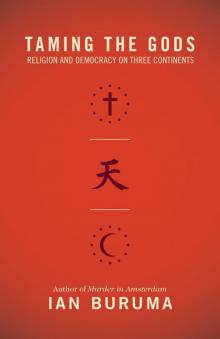 Taming the Gods
Taming the Gods The China Lover
The China Lover A Tokyo Romance
A Tokyo Romance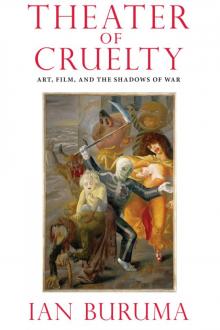 Theater of Cruelty
Theater of Cruelty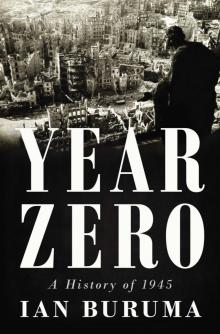 Year Zero
Year Zero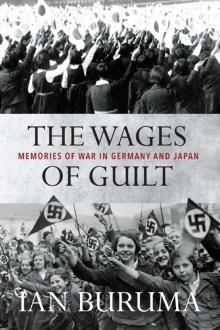 The Wages of Guilt
The Wages of Guilt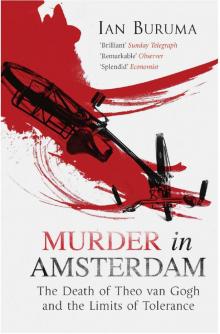 Murder in Amsterdam
Murder in Amsterdam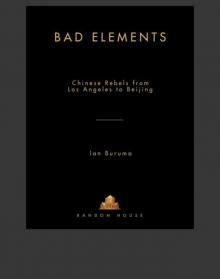 Bad Elements
Bad Elements Their Promised Land
Their Promised Land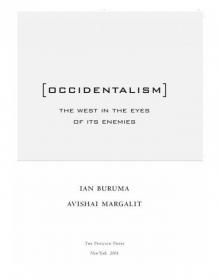 Occidentalism
Occidentalism Anglomania
Anglomania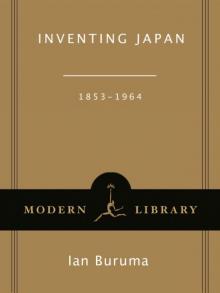 Inventing Japan: 1853-1964 (Modern Library Chronicles)
Inventing Japan: 1853-1964 (Modern Library Chronicles)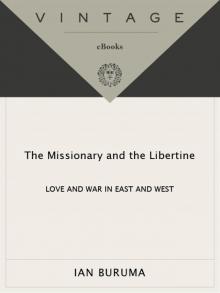 The Missionary and the Libertine
The Missionary and the Libertine